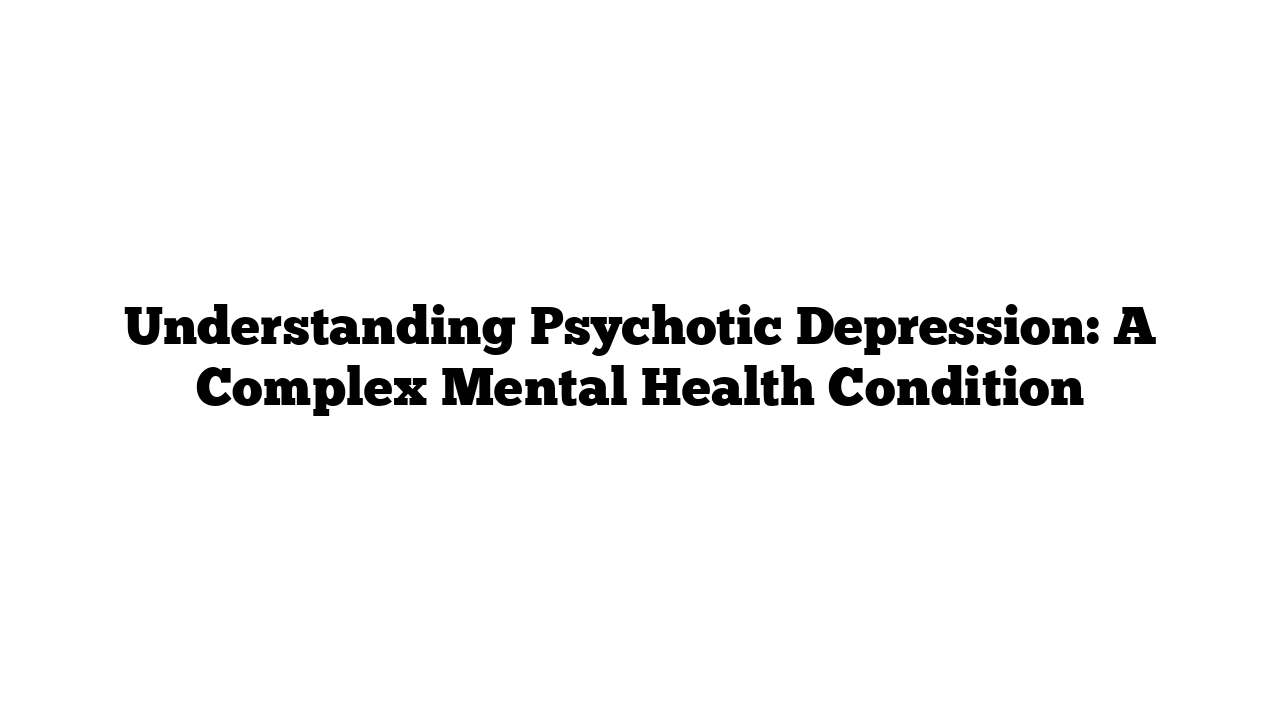Depression is one of the most widely recognized mental health conditions. However, its subtypes, like psychotic depression, are less discussed yet critically important to understand. Psychotic depression, a severe form of major depressive disorder (MDD), brings unique challenges and symptoms that set it apart. This article explores how psychotic depression differs from typical depression, its symptoms, causes, and treatments, all explained with clarity and depth.
What Is Depression?
According to the American Psychological Association (APA), depression is a negative emotional state ranging from unhappiness and discontent to extreme sadness, melancholia, and pessimism. These feelings can disrupt everyday life, often accompanied by somatic, cognitive, and social changes. Common symptoms include:
- Changes in sleep patterns (insomnia or oversleeping)
- Appetite changes (overeating or loss of appetite)
- Low energy or motivation
- Difficulty focusing or decision-making
- Withdrawal from social settings
These symptoms represent what most people think of when they hear “depression.” However, depression exists under a broader umbrella of mood disorders.
Depressive Disorders and Their Variants
Depressive disorders encompass several conditions where sadness is a predominant symptom. These include:
- Major depressive disorder (clinical depression)
- Persistent depressive disorder (dysthymia)
- Premenstrual dysphoric disorder (PMDD)
- Seasonal affective disorder (SAD)
- Postpartum depression
- Bipolar disorder, mania, and hypomania
Among these, psychotic depression is a subtype of major depressive disorder, characterized by additional features of psychosis, including hallucinations and delusions.
What Is Psychotic Depression?
Psychotic depression combines the symptoms of major depression with psychosis, a condition defined as an impaired ability to discern reality. According to the APA, psychosis disrupts perception, cognition, and emotional processing, manifesting as:
- Delusions (false beliefs, such as feeling excessively guilty or believing one is gravely ill)
- Hallucinations (seeing or hearing things that aren’t there)
- Disorganized speech
Unlike conditions like schizophrenia, where individuals believe their hallucinations are real, people with psychotic depression recognize their unreality. This awareness adds to their distress.
Key Symptoms of Psychotic Depression
- Persistent depressed mood
- Loss of interest in previously enjoyable activities (anhedonia)
- Severe fatigue
- Suicidal thoughts or attempts
- Psychomotor agitation (restlessness or excessive movement) or psychomotor retardation (slowed thinking and physical movements)
- Difficulty concentrating or making decisions
- Hallucinations or delusions, often related to themes of guilt or worthlessness
Causes of Psychotic Depression
The exact cause of psychotic depression remains unclear. However, research highlights several contributing factors:
- Genetics: A family history of mood disorders can increase susceptibility.
- Stress or Trauma: Events like divorce, financial crises, or the loss of a loved one may trigger the onset.
- Brain Development: Variations in brain function may predispose individuals to psychotic symptoms.
How Psychotic Depression Differs from Schizophrenia
While both conditions involve psychosis, the key distinction lies in awareness.
- Schizophrenia: Individuals believe their hallucinations or delusions are real.
- Psychotic Depression: Individuals recognize their psychotic experiences are not real, contributing to their emotional distress.
Recognizing the Warning Signs of Psychosis
Psychosis itself is not an illness but a symptom of underlying mental health conditions. Behavioral signs of psychosis include:
- Paranoia or distrust of others
- Confused speech or trouble communicating
- Sleep disturbances
- A decline in self-care or personal hygiene
- Difficulty distinguishing reality from fantasy
According to Mental Health America, approximately 3% of the U.S. population experiences psychosis at some point in their lives.
Treatment Options for Psychotic Depression
Effective treatment combines therapy, medication, and support:
- Cognitive Behavioral Therapy (CBT): Helps patients identify and manage negative thought patterns.
- Medication: A combination of antidepressants and antipsychotic drugs is commonly prescribed. Consult a licensed professional to determine the right treatment plan.
- Support Systems: Offering empathy and a judgment-free environment is crucial for individuals coping with psychotic depression.
Quote: “Support, alongside medical interventions, can make a world of difference to someone battling depression.”
How to Help Yourself or Someone Else
If you or someone you know is struggling:
- Reach out to a trusted individual or a mental health professional.
- Monitor for changes in behavior, such as agitation or withdrawal.
- Encourage open, judgment-free conversations.
- If there’s a risk of self-harm, involve a caregiver or social worker immediately.
Remember, depression can feel overwhelming, but you’re not alone. Reaching out is the first step toward healing.
Reference website:
- MedicalTimes.io
- American Psychological Association
- National Institute of Mental Health (NIMH)
- Mental Health America
FAQs
- What is psychotic depression?
Psychotic depression is a subtype of major depressive disorder characterized by psychosis, including hallucinations and delusions. - How does psychotic depression differ from regular depression?
It includes psychosis symptoms, such as delusions and hallucinations, alongside typical depression symptoms like low mood and fatigue. - Can psychotic depression be treated?
Yes, treatments include therapy, medication, and support systems tailored to the individual’s needs. - What causes psychotic depression?
It may result from genetics, stress, trauma, or brain function differences. - Is psychosis the same as psychotic depression?
No, psychosis is a symptom, whereas psychotic depression is a mental health condition involving both depression and psychosis. - Are people with psychotic depression aware of their delusions?
Yes, they usually recognize their hallucinations or delusions as unreal, unlike individuals with schizophrenia. - Can psychotic depression lead to suicide?
Unfortunately, the suicide risk is higher during the acute phase. Professional help is crucial. - Who is at risk for psychotic depression?
Those with a family history of depression, high stress levels, or prior traumatic experiences may be more vulnerable. - What role does support play in treatment?
Emotional support is vital. It fosters recovery and reduces feelings of isolation. - Where can I find more information on psychotic depression?
Visit trusted sources like MedicalTimes.io or mental health organizations.
